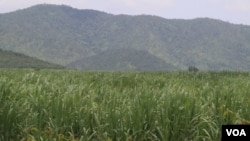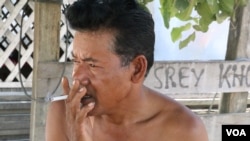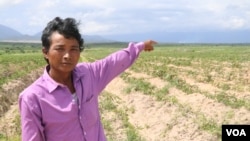Until a decade ago, the indigenous minority Suoy villagers in Trapaing Chour Commune eked out a living by working their paddies and practicing rotational farming in the forests among the foothills of Phnom Aural, Cambodia’s highest mountain.
The Suoy relied on ancestral community land that the government reserved for them within Phnom Aural Wildlife Sanctuary, located in Kampong Speu Province’s Aural District in southwestern Cambodia.
In 2009, however, the estimated 1,300-member Suoy community - the last of its kind in the country - was dealt a sudden blow when the government granted HLH Agriculture Company Ltd. a 10,000-hectare economic land concession that covered swathes of the sanctuary and, according to villagers, some 2,000 hectares of community land.
The villagers were offered no compensation and many have since struggled to cope with the resulting loss of livelihoods; some have protested in vain for years to reclaim the land.
In the run-up to the recent national elections, the villagers briefly gained hope when local officials of the long-ruling Cambodian People’s Party (CPP) promised to resolve the dispute if they supported the party at the polls.
Election promises
“They said that after elections the land dispute would be solved,” according to Tuon Seoun, 55, who lost access to 20 hectares of communal land after the company arrived and has had to sell all his cattle to survive.
Prum Sothy, who lives in a part of Trapaing Chour where some 3,000 mostly Khmer farmers lost land to another company a decade ago, said similar promises were made there.
“Commune and district authorities met with villagers and told them to vote for CPP and then there will be solutions,” said Prum Sothy, who lost 10 hectares of mango, durian and orange trees when Phnom Penh Sugar Company of tycoon and CPP senator Ly Yong Phat was granted a 9,000-hectare concession.
Now, more than a month after the elections - which the CPP won amid widespread international condemnation over the lack of a free and fair vote - the villagers are wondering if officials will follow through on their promises.
“I went to meet them [on August 4] and they said they would solve it after a new government was formed,” Tuon Seoun said.
He showed a VOA reporter a recent WhatsApp message from Kampong Speu Provincial Governor Vy Samnang which said: “Don’t worry, we will redouble our work to help you since all people voted to support CPP.”
“If there is no solution I will hold more protests,” said Tuon Seoun, who has organized many public protests at both provincial offices and national level authorities over the years.
Prum Sothy, who represents a group of affected farmers, had little hope that the election promises would turn into action, adding, “It’s lies and more lies.”
‘These promises are not genuine’
Vann Sophat, a land rights coordinator at the Cambodian Center for Human Rights, said CPP officials across the country often promise local communities resolutions to the land disputes ahead of the polls.
“We received information from communities that there were pledges (ahead of recent elections) to solve their land disputes. Land disputes are an issue that politicians can keep as a hostage.
“But it seems these promises are not genuine,” he said, adding that disputes are rarely resolved as they are often complicated and resolutions require high-level government support and cooperation from the businessmen involved.
Large-scale land grabs by politically well-connected local and international companies have become rampant in Cambodia since the early 2000s, often causing deforestation and heavy social impacts on countless rural communities, most of which rely on subsistence agriculture and local natural resources.
According to documentation by local human rights group Licadho, some 2.14 million hectares of land - or around 12 percent of Cambodia’s total geographical area - has been given to companies in 275 land concessions.
Rights groups have long complained that Prime Minister Hun Sen’s government fails to protect or compensate affected communities in line with Cambodian laws, nor does it publicly disclose to whom and how land concessions are granted.
Hun Sen’s government never attempted to restore a land tenure registration system that was destroyed by the Khmer Rouge regime.
Hun Sen ‘regrets’ unpopular land grabs
Resistance by local communities and activists against land grabs has been building for many years. The issue was seen by many observers as contributing to a sharp drop in the CPP’s popularity in the 2013 national elections when the party narrowly avoided defeat to the Cambodian National Rescue Party (CNRP) in a disputed poll result.
The CNRP has promised voters that it would address land disputes and related issues such as rule of law and government corruption.
In Trapaing Chour, former CNRP Deputy Commune Chief Vorn Lang said he believed his party did well in the 2017 Commune Elections because of local discontent over unresolved land disputes.
CPP Commune Chief Touch Nem acknowledged the disputes had dented his party’s popularity, though he insisted that affected villagers could find alternative income as laborers for the sugar and cassava companies that seized their lands.
Ahead of this year’s election, the CPP government banned the CNRP, arrested its leader Kem Sokha, and launched a crackdown on independent media and civil society. CPP officials at local and national levels sought to persuade voters to turn up and support the party through a mix of promises and threats.
With its main challenger banned, the CPP won all 125 National Assembly seats in the July 29 vote. After a government was formed, authorities released Kem Sokha on Sept. 10. A well-known land rights activist, Tep Vanny, was also released recently along with several other political prisoners.
CPP spokesman Sok Eysan told VOA Khmer that the party knows land disputes are affecting its popularity, but he claimed it has solved “hundreds of thousands of land disputes,” causing the number of disputes to go down.
Prime Minister Hun Sen, in rare, extensive remarks on the issue published recently by VOA, said he regretted not tackling the issue earlier.
“My regret is the lateness of land reform. And solving land disputes…. [W]e should have given land titles to the people more speedily, but we delayed for 10 years giving land titles to the people,” he told American filmmaker Robert H. Lieberman in an interview for the 2016 documentary 'Angkor Awakens.’
VOA obtained the raw, unaired footage from the filmmaker.
In 2012, Hun Sen publicly set a moratorium on new land concessions and announced a land-titling program in his own name run by students who were to resolve land disputes. But rights groups like Licadho said that in practice new land grabs continue and old disputes remain unresolved.
Well-connected company
In Trapaing Chour, CPP Commune Chief Touch Nem said authorities would find solutions for affected villagers. “We will help them as promised [before the polls] but I don’t know when the land dispute will be solved; it depends on the higher officials from the Ministry of Land Management,” he said.
If the history of government responses are anything to go by, the prospects for solutions to the disputes in Trapaing Chour remain slim, in particular, because HLH Agriculture Company Ltd. is reportedly connected to the highest levels of government.
According to London-based natural resource watchdog Global Witness, Prime Minister Hun Sen’s younger sister Hun Seng Ny is linked to the company. She reportedly visited in 2010 and 2012 to meet with local officials and villagers, according to media reports at the time which cited rights group Licadho, but no resolution or compensation has been offered to the villagers.
Those affected by the land grab life will likely continue to struggle to make ends meet.
“This was my land,” said villager Nhoung Chhum, 45, while gesturing to part of HLH’s vast plantation.
Since he lost it, he said, his eight-member family has fallen into poverty, forcing him and his oldest son to take up work as day laborers for the company or as migrant workers in Thailand. His three daughters went to work at a garment factory on the outskirts of Phnom Penh, while another two children are still in school.
Nhoung Chhum has bitterly accepted the paltry $7.50 in daily wages that the company pays him to tend to the cassava crop growing where he and his fellow Suoy villagers once farmed.
“If I don’t work as day laborer how can I support my life? It is miserable a situation because I lost my land to the company,” he said












